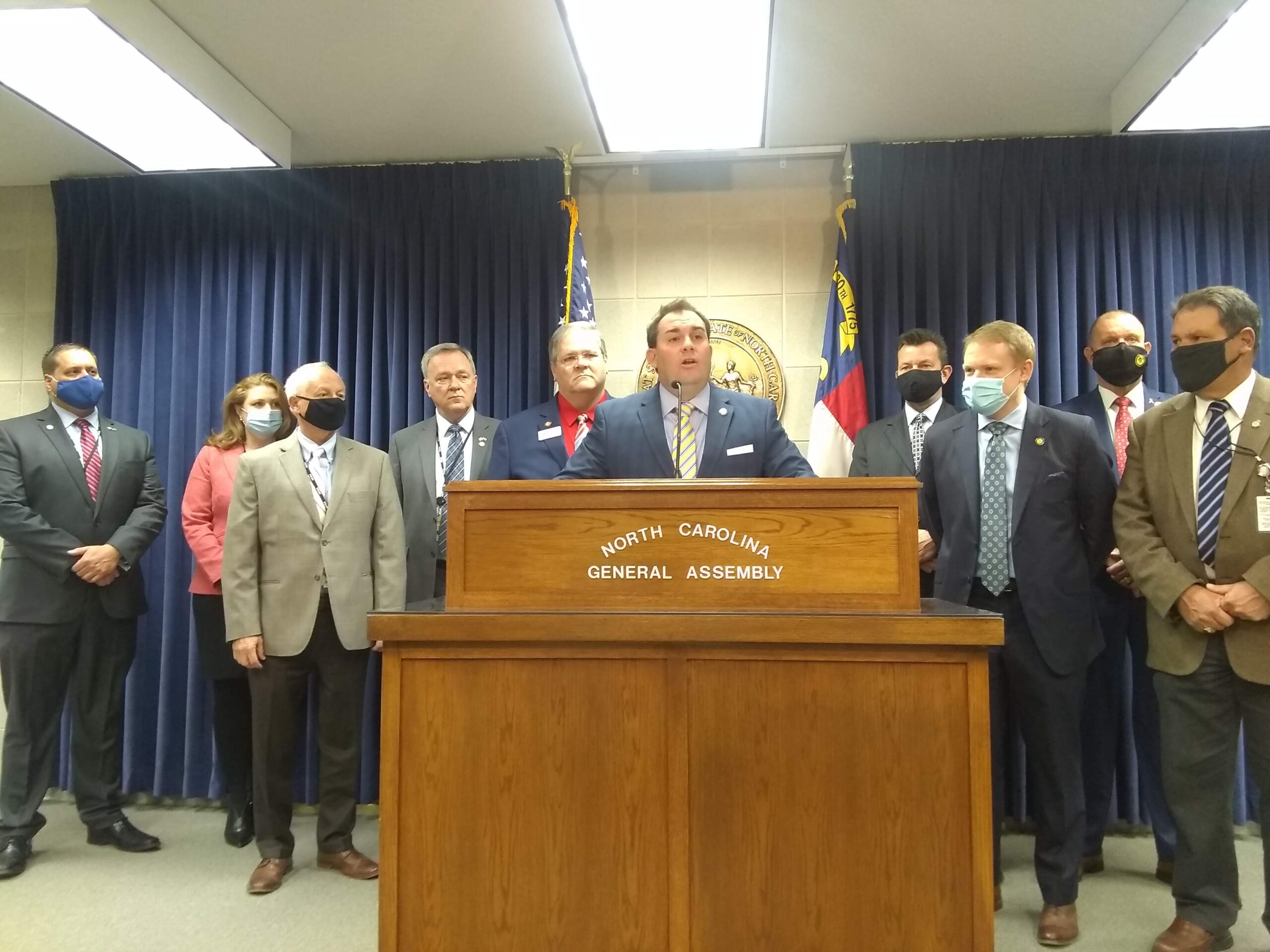
RALEIGH — Previously, North State Journal sat down with House Majority Leader John Bell (R-Wayne) to chat about some of the military-related bills he has had a hand in this session. Bell also talked about revamping the way the state and governor respond to emergencies like the COVID-19 pandemic, the governor’s proposed budget and what the state’s budget might look like.
With regard to the Emergency Powers Act, Bell reiterated comments he made during debate on the House floor prior to its passage along party lines by the House. House Bill 264 would amend the governor’s ability to extend state of emergency-based orders unilaterally and indefinitely, as Cooper has done over the last year. The Senate has passed a similar bill requiring Council of State approval of emergency declarations within 10 days.
“In a state of emergency, I believe we should have all hands on deck, not just one set of hands,” Bell said.
“It was partisan, and my colleagues on the other side of the aisle, they viewed it as a power grab or taking power away from the governor,” said Bell. “This doesn’t change anything for the governor except he has to get Council of State authority or approval when we’re in state of emergency, which is no different than what he has done up until he didn’t get what he wanted. Then he looked at how he could unilaterally navigate around that.”
Bell said that lawmakers run bills every year that are basically “lessons learned.” He said the General Assembly would be filing a “disaster mitigation piece” after what had been learned during hurricanes and floods that have hit the state.
“We’ve never experienced a pandemic before. We saw some issues in state government,” Bell said. “We have addressed those, and now we’re looking at the issue where, hey, we probably need more heads involved in this, instead of one person unilaterally dictating what happens to the whole entire state. So, that’s why we wanted to include the Council of State.
“When you look at the Council of State, you’ve got Commissioner Troxler sitting there, who feeds this entire state — it’s the largest economic impact. Why not include him? You’ve got Catherine Truitt, the secretary of Public Instruction. Why not include her?” asked Bell. “All these people that oversee entities of government, that control and oversee government and have an impact on everyday life. Why not include them in the conversation?”
Other states like Kansas, Ohio and New York are looking at similar legislation after pandemic orders continued to be extended, often unilaterally, by state governors. Earlier this month, the Wisconsin Supreme Court ruled that the state mask mandate enacted by the governor was unconstitutional.
“It’s both red and blue states,” Bell said, “But at the end of the day, our country and our state was not founded on unilateral rule. There’s no unilateral rule in a constitutional republic.”
Bell continued, “You are seeing these things start to unfold. Just over the last couple weeks you saw where the governor lifted executive orders, and it was very ironic that he lifted the executive orders right before a verdict in a lawsuit.”
Referencing a Jan. 9 Raleigh News and Observer article, Bell cited that Cooper had stated that when the pandemic “turns the corner,” that “all things were on the table” with regard to amending the Emergency Management Act.
“He said that. We have the statement,” Bell said.
“It may be as soon as we turn the corner on this pandemic, and later on in the summer and fall; that may be something we want to look at,” Cooper said, and added that he believes they have been “complying with the law,” and that “the court decisions have shown that.”
Bell said that the governor made fast restriction changes “the day before the finalization of a court case that did not look good” for him.
The Wayne County lawmaker also brought up the governor’s disparate treatment of bars and restaurants, saying that no one has been able to tell him why one was being forced to stay closed while the other one was allowed to be open.
On the topic of the budget, Bell called Cooper’s budget a “wish list.”
“The governor’s budget is a political document,” Bell said. “It is everything that he’s run on and that all people that support him want and wish they could have.” He said that approach didn’t start with Cooper but has been something that has gone on “throughout the years.”
The governor’s proposed budget has increased spending of around 12%, which is roughly $2.8 billion. Included in Cooper’s proposal are seven bonds totaling around $4.7 billion in new debt, as well as Medicaid expansion for 600,000 people at the cost of $500 million.
“What you saw was a great big laundry list of his agenda and a wish list. Unfortunately, we don’t live in a land of wishes,” Bell said. “We have to actually have fiscal restraint and be responsible to move the state forward. That is why we are not in a situation where we have shortfalls. We have surpluses. That’s why you’ve seen our tax reform and our policies we put in during the last 10 years work, and that’s why our economy here is strong.”
Like his past budgets, Cooper attempts to cut the popular Opportunity Scholarship for low-income students and earmarks $800,000 for an “Office of Equity Affairs” for the Department of Public Instruction.
Bell noted Cooper’s opposition to the scholarships and also commented on Medicaid Expansion, stating that “we’re not going to expand Medicaid. We’re not even going to have that discussion.” He went on to say that lawmakers “do believe in access to care, because that is an issue that we need to address here in North Carolina” and that they were working on it, specifically mentioning telehealth options.
Cooper’s budget includes a nearly 10% raise over the biennium to teachers; whereas, the other state employees would not receive even half of that amount.
Due in part to Cooper’s executive orders and the N.C. Department of Health and Human Services’ StrongSchools Toolkit, the state’s K-12 students weren’t allowed to attend school in-person and had to be taught using remote instruction.
Bell said state employees and non-instructional employees who could not work remotely like teachers did were “shorted” by Cooper.
“They [non-instructional education staff] were there day in and day out delivering meals when even kids were not in school,” Bell said. “And you look at our frontline workers through state government, that just frankly were neglected in the governor’s budget, and I hope we will be able to correct that.”
Cooper has vetoed every budget sent to him since assuming office in 2017. Currently, he holds the veto record with 54, the most recent veto was a bill that would have returned K-12 students to full-time, in-person instruction.
“I think Gov. Cooper has the opportunity to figure out what he wants his legacy to be,” said Bell when asked if he thought the governor would veto this year’s budget. “Does he want to work with us and better the state, or does he want to be known as the governor to veto the most bills in history?”
Bell said that Democrats in both chambers of the legislature have said they want to work on the budget, and Republicans are hoping those Democrats will “join us and put forth a very strong, bipartisan budget for the state.”



